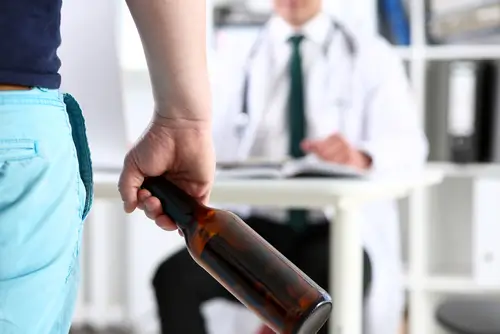When a person who is addicted to alcohol stops drinking, they may experience symptoms of withdrawal. A lot of people have heard joking references to someone “getting the DTs” when they first become sober. The condition is called delirium tremens and can cause serious health repercussions, including shaking after drinking.
What Shaking After Drinking Means
A person who stops drinking alcohol after a prolonged period of being addicted to it may develop delirium tremens, commonly referred to as the DTs. It is also called alcohol withdrawal delirium (AWD).
These tremors involve involuntary shaking in one or more areas of the body. The tremors can happen consistently or intermittently. The shaking develops due to a malfunction in the brain that control’s the body’s muscles. The malfunction is brought on by the sudden stopping of alcohol consumption.
DTs typically start anywhere from several hours to a few days after an individual’s last alcohol drink. Shaking after drinking can last anywhere from a couple of days to a week. The tremors usually peak between 24 to 72 hours after the person last consumed alcohol.
Developing DTs happens most commonly with adult males, particularly white, single, younger men. It also surfaces a lot in people who drink heavily and over a long period of time, and those who have gone through the alcohol withdrawal process before.
Hangover Shakes
When you have a hangover, you might experience more than just the usual flu-like symptoms. You might notice some neurological symptoms involving involuntary body movements or spasms, often called “hangover shakes.”
When we drink alcohol, it can be harmful to our bodies, and our system has to adapt to handle it. Normally, our brain and body use two chemicals called GABA and Glutamate to send signals. GABA helps us feel calm, while Glutamate makes us feel excited. When these chemicals are balanced, we feel mentally and physically balanced too.
But when we consume alcohol, it reduces the amount of GABA in our body. This happens because alcohol replaces GABA for a while, acting as a calming chemical. When the effects of alcohol wear off, we have less relaxing GABA, but we still have a lot of Glutamate. This imbalance can cause us to feel more mentally and physically stimulated, leading to spasms or shakes.

Is Shaking After Drinking Dangerous?
While the majority of cases of delirium tremens do not prove to be life-threatening, they still can cause some damage and even death. Approximately 5% of people who go through alcohol detoxification will develop DTs. If a person does not seek immediate treatment for the tremors, they become at risk for a stroke, heart attack, and death.
Considerations that can factor into whether or not a person develops shaking after drinking can relate to if they have a history of having seizures. This includes having had DTs during previous alcohol withdrawal or seizures unrelated to AWD.
DTs have the potential to cause dangerous changes in a person’s breathing, blood circulation, and body temperature. These developments can result in conditions that require immediate medical attention and can be life-threatening.
Read more: 8 Ways To Get Through Severe Anxiety After Getting Sober
Symptoms of Having Delirium Tremens
Many symptoms can occur as part of experiencing DTs. These can include:
- Shaking hands or feet
- Rhythmic shaking of the body
- Muscle tremors
- Difficulty with eye movements
- Problems holding and using utensils
- Chest pain
- High blood pressure
- Fever
- Sweating
- Nausea and vomiting
- Hallucinations
- Sleepiness
- Hyperactivity
- Rapid heartbeat
- Passing out
- Nightmares

What Happens if You Develop Delirium Tremens
A physician will give a person suspected of having DTs an exam and take into account their history with alcohol addiction. A doctor may perform tests related to a person’s blood magnesium and blood potassium levels, an EEG (electroencephalogram), an MRI, and a metabolic panel.
Treatment typically happens in a hospital setting. Doctors may utilize certain medications to help a person who suffers from shaking after drinking withdrawal. Medications given to treat symptoms may include:
- Benzodiazepines like Librium or Valium can help manage withdrawal symptoms, including tremors, and reduce the risk of developing DTs
- Thiamine can lower the risk of developing Wernicke-Korsakoff Syndrome (WKS) and decrease tremors
- Propranolol is a beta-blocker that can help reduce tremors
- Anticonvulsants
- Blood pressure medication
- Pain medication
- Antipsychotic drugs
- Medication that regulates the heartbeat
- Intravenous fluids
Other Symptoms of Alcohol Withdrawal
When a person who has struggled with alcohol addiction for a long period of time makes the brave choice to enter recovery, they often develop a concern about what the initial stages of withdrawal will be like.
Side effects often occur, including delirium tremens, but shaking after drinking withdrawal is not the only possible one. Typical side effects independent of DTs that may occur include:
- Headache
- Nausea and vomiting
- Fever
- Insomnia
- Lethargy
- Sweating
- High blood pressure
- Racing heart
- Confusion
- Depression
- Anxiety
- Intense craving for alcohol
Read more: How Does Alcohol Affect Sleep?
Is Medical Supervision Important When Detoxing from Alcohol?
Due to the potentially serious and even deadly nature of DTs, a person going through alcohol withdrawal should be monitored by medical professionals. Detoxing from alcohol alone or at home without professional help can be dangerous.
Unexpected medical symptoms may arise that require treatment. A person detoxing in a residential or hospital program will have access to round-the-clock medical care that can address tremors and other medical side effects that may occur.
In addition to difficulties related to medical issues, many emotional issues may arise during the initial stages of detoxification. Alcohol abuse often masks difficult emotions and assists a person in not thinking about past and current life situations that stress them out.
When alcohol usage stops, emotions may come flooding to the surface. An individual who seeks withdrawal supervision in a professional treatment program will have access to ways to help ease difficult emotions. Therapists may be present and able to engage with their patients via talk therapy. Medications to help ease symptoms of anxiety, panic, and depression may also be utilized.

Alcohol Addiction Treatment in California
Here at Launch Centers, we understand how addiction can turn a person’s entire world upside down. Fortunately, we also know that through effective treatment, a successful recovery is attainable. If you or a loved one are struggling with an addiction, Launch Centers recovery center us here to help. Allow our knowledgeable team of professionals to give you the tools necessary for lasting success. Our professional treatment program in Los Angeles treats alcohol and drug addiction, as well as helps people learn to manage any accompanying mental health issues. Our long-term programs offer multiple treatment options to help a person learn to navigate recovery from alcohol addiction and hit the reset button on their lives. There has never been a better time to seek the help that you deserve. Call us at 424-238-3173 or visit our admissions page today to get started.





